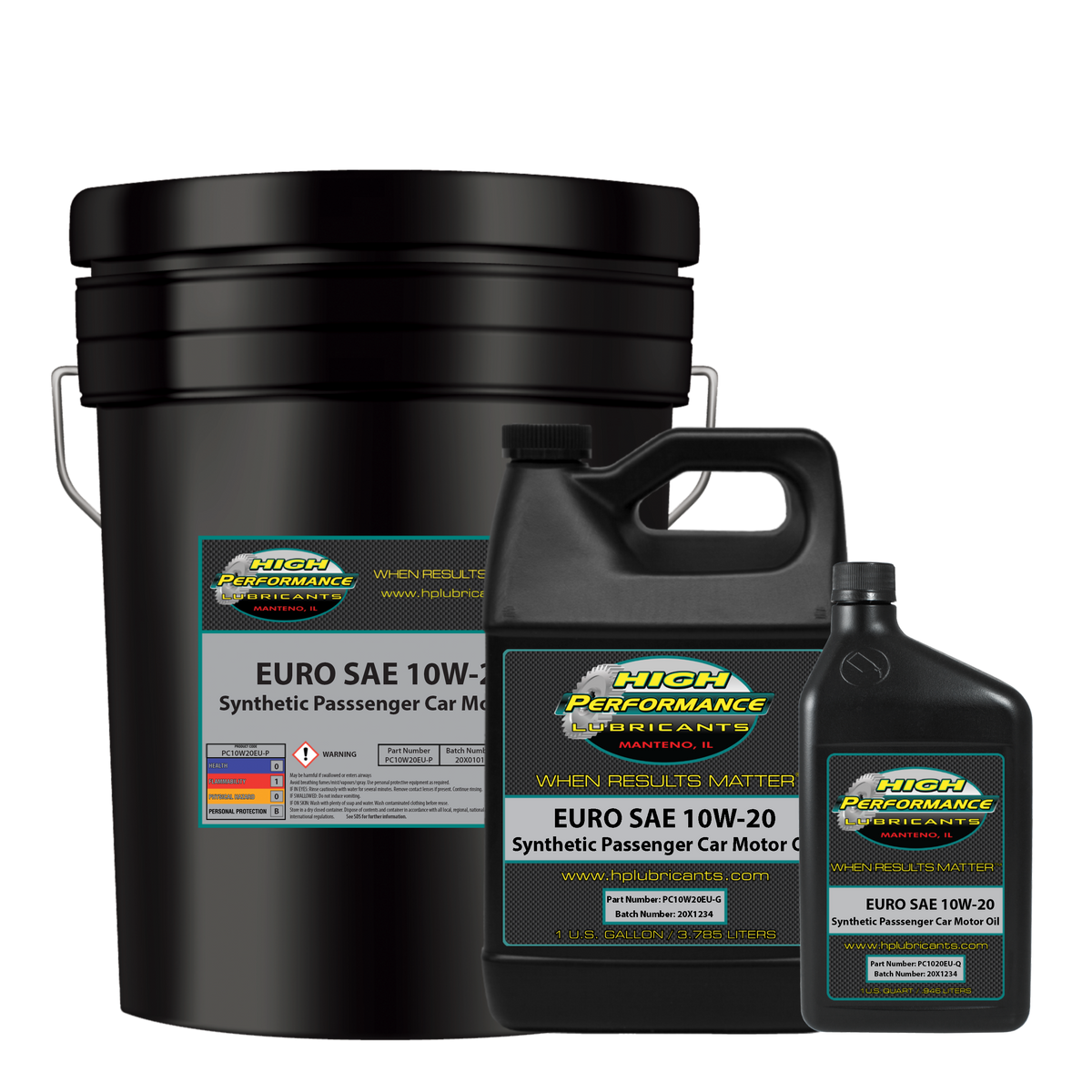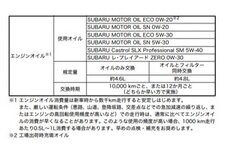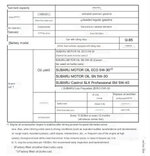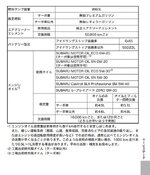I have not seen that long drives help burn off fuel in DI Subaru’s.Within warranty, any good 0W-20 D1G3 oil. Once warranty is up, M1 ESP 0W-30/5W-30. Take that FA24F on a nice long drive weekly to try to flash off some fuel dilution.
You are using an out of date browser. It may not display this or other websites correctly.
You should upgrade or use an alternative browser.
You should upgrade or use an alternative browser.
Oil recommendations for Subaru 2.4T
- Thread starter Elijah1
- Start date
Elijah1
Thread starter
Have you done UOAs to validate this? Just curious how you would know.I have not seen that long drives help burn off fuel in DI Subaru’s.
There have been multiple DI Subaru uoa’s posted in the UOA forum with high fuel and the owners stated that they did a lot of highway miles.Have you done UOAs to validate this? Just curious how you would know.
Elijah1
Thread starter
Gotcha.There have been multiple DI Subaru uoa’s posted in the UOA forum with high fuel and the owners stated that they did a lot of highway miles.
In my Legacy GT with the same engine I've been using Castrol Edge EP 0w20 and Liqui Moly (both special tec Asia/America and Molygen 0w20 flavours) in 3000 mile intervals,sometimes going longer in warmer months. Been using the Hengst H345w oil filter and Wix 57055.So I just purchased a new Subaru Outback Onyx XT. I’ll be doing an oil change around 2,500 miles to get all the assembly junk out of the engine. I live in northern IN so hot summers, cold winters. Commute is about 12 miles a day. I’m not brand loyal, and don’t care if I change weights from the 0W-20 the manual recommends.
In the winter months on UOAs I have found some fuel dilution, but there were cold starts and idling for warm up in cold temps. The dilution tends to ease off in warmer months I've found . You will notice copper as mentioned in the first few UOAs, that should level out.
Congrats on the new vehicle!
AutoMechanic
Site Donor 2024
Any name brand 20 would work great for your Subaru. I personally would not use anything thicker in these but that’s just my opinion I’m a Subaru/ Toyota tech and without further comment I wouldn’t use anything but the 20. If I say anything about it everyone will disagree and pointlessly stir the pot so that’s why no other comment from me.
Your observations and experiences would be an invaluable first hand account of why one viscosity is preferred over something else.Any name brand 20 would work great for your Subaru. I personally would not use anything thicker in these but that’s just my opinion I’m a Subaru/ Toyota tech and without further comment I wouldn’t use anything but the 20. If I say anything about it everyone will disagree and pointlessly stir the pot so that’s why no other comment from me.
If you say water is wet people here will always disagree. It's the way of BITOG and then starting calling anyone who disagrees uniformed and ignorant.
They can get bent.
I'd love to hear what you're seeing.
AutoMechanic
Site Donor 2024
Thanks. I appreciate that comment. And you’re exactly right. And I’m sure there will be plenty to say I don’t know what I’m talking about or what I’m saying is false but who cares these are true experiences that others may not have experienced. But keep in mind most also don’t have experience working on these and have never torn one down or replaced a turbo on them. Now my experience isn’t like documented anywhere to prove as a fact but it’s a pretty good logic to me.Your observations and experiences would be an invaluable first hand account of why one viscosity is preferred over something else.
If you say water is wet people here will always disagree. It's the way of BITOG and then starting calling anyone who disagrees uniformed and ignorant.
They can get bent.
I'd love to hear what you're seeing.
Now on with the 20 over 30 is because for awhile at my dealership (and still currently) we we’re seeing issues with these engines running hot and some blowing the turbo which the running hot may lead most to believe there is a problem with the cooling system, well not on these. Now we don’t know as a fact that 30 oil was used but it was a weird occurrence that on the oil change stickers all of them were from different independent shops and it said xxW30 was used. Well we never seen this problem on a car that came in with history of 20 oil in it. We believe the 30 causes too much resistance for these turbos. I’ve done same racing in these Subaru turbo engines by accident while test driving them for various things and when you drive one that has 30 in it you can tell a loss in power. Some will say there is minimal difference in 20 vs 30 oils which maybe true but some of these engines can tell that little bit of difference. After some phone calls to the previous shops they verified that a 30 was used. I can’t tell you how many of these turbos I’ve replaced in these engines and how many I’ve seen replaced by my coworkers. More than I can count on my hands just for the ones I’ve replaced. Fortunately they are pretty simple to do at least for me. Many blame various things for 20 oils being spec like CAFE but the manufacturer knows what they are doing and that’s bottom line. And Subaru is smart for sticking to their 6k interval recommendation too.
And a few last key points are after the turbo was replaced in the ones with this problem and we put the proper oil spec in we haven’t had a single one return for the same issues.
And lubrication is the most important thing for a turbo or engine so that little bit of difference in the thickness of the oil may have been life or death for these turbos.
The last one is sure it could have been a low quality oil used in all of these that possibly left deposits in the turbos but it still shows why the recommended oil is important. The oil tube that leads to the turbo from the pump on these particular engines is pretty small from other ones that I’ve seen. So they really need to make it a little bigger. I believe this maybe a factor in these issues.
I believe the issues aren’t more widespread because most people actually run the right type of oil in their cars.
Last edited:
- Joined
- Jul 22, 2023
- Messages
- 146
I'm no expert but what you say makes complete sense to me. I created a recent post on my experience with my Santa Fe 2.0 and how the engine was a bit "rougher" and the turbo squealed at startup. Changing the brand/quality of oil (not the weight) and oil filter solved both of those issues. It's a testament to me that all synthetic oils and/or oil filters are not created equal by a long shot.And a few last key points are after the turbo was replaced in the ones with this problem and we put the proper oil spec in we haven’t had a single one return for the same issues.
And lubrication is the most important thing for a turbo or engine so that little bit of difference in the thickness of the oil may have been life or death for these turbos.
The last one is sure it could have been a low quality oil used in all of these that possibly left deposits in the turbos but it still shows why the recommended oil is important. The oil tube that leads to the turbo from the pump on these particular engines is pretty small from other ones that I’ve seen. So they really need to make it a little bigger. I believe this maybe a factor in these issues.
I believe the issues aren’t more widespread because most people actually run the right type of oil in their cars.
Elijah1
Thread starter
Definitely taking this advice to heart.Thanks. I appreciate that comment. And you’re exactly right. And I’m sure there will be plenty to say I don’t know what I’m talking about or what I’m saying is false but who cares these are true experiences that others may not have experienced. But keep in mind most also don’t have experience working on these and have never torn one down or replaced a turbo on them. Now my experience isn’t like documented anywhere to prove as a fact but it’s a pretty good logic to me.
Now on with the 20 over 30 is because for awhile at my dealership (and still currently) we we’re seeing issues with these engines running hot and some blowing the turbo which the running hot may lead most to believe there is a problem with the cooling system, well not on these. Now we don’t know as a fact that 30 oil was used but it was a weird occurrence that on the oil change stickers all of them were from different independent shops and it said xxW30 was used. Well we never seen this problem on a car that came in with history of 20 oil in it. We believe the 30 causes too much resistance for these turbos. I’ve done same racing in these Subaru turbo engines by accident while test driving them for various things and when you drive one that has 30 in it you can tell a loss in power. Some will say there is minimal difference in 20 vs 30 oils which maybe true but some of these engines can tell that little bit of difference. After some phone calls to the previous shops they verified that a 30 was used. I can’t tell you how many of these turbos I’ve replaced in these engines and how many I’ve seen replaced by my coworkers. More than I can count on my hands just for the ones I’ve replaced. Fortunately they are pretty simple to do at least for me. Many blame various things for 20 oils being spec like CAFE but the manufacturer knows what they are doing and that’s bottom line. And Subaru is smart for sticking to their 6k interval recommendation too.
And a few last key points are after the turbo was replaced in the ones with this problem and we put the proper oil spec in we haven’t had a single one return for the same issues.
And lubrication is the most important thing for a turbo or engine so that little bit of difference in the thickness of the oil may have been life or death for these turbos.
The last one is sure it could have been a low quality oil used in all of these that possibly left deposits in the turbos but it still shows why the recommended oil is important. The oil tube that leads to the turbo from the pump on these particular engines is pretty small from other ones that I’ve seen. So they really need to make it a little bigger. I believe this maybe a factor in these issues.
I believe the issues aren’t more widespread because most people actually run the right type of oil in their cars.
- Joined
- Dec 5, 2021
- Messages
- 8
I did one UOA on our '21 Ascent with the 2.4 turbo so far. Engine had 72k miles on it, oil had 5k on it. Half the miles were interstate driving from Iowa to southern Texas and back and the other half were my daily commute to work, which is 80 miles round trip, all highway. Oil still had 2.2% fuel. For what it's worth, it was Full synthetic Motorcraft from the dealer we bought it from and it was still in 20 weight viscosity.Have you done UOAs to validate this? Just curious how you would know.
How exactly does the turbo “tell” that a 30 grade was used and that it’s not really a 20 grade with really cold ambient temps? I’ll toss the BS flag on that claim.Thanks. I appreciate that comment. And you’re exactly right. And I’m sure there will be plenty to say I don’t know what I’m talking about or what I’m saying is false but who cares these are true experiences that others may not have experienced. But keep in mind most also don’t have experience working on these and have never torn one down or replaced a turbo on them. Now my experience isn’t like documented anywhere to prove as a fact but it’s a pretty good logic to me.
Now on with the 20 over 30 is because for awhile at my dealership (and still currently) we we’re seeing issues with these engines running hot and some blowing the turbo which the running hot may lead most to believe there is a problem with the cooling system, well not on these. Now we don’t know as a fact that 30 oil was used but it was a weird occurrence that on the oil change stickers all of them were from different independent shops and it said xxW30 was used. Well we never seen this problem on a car that came in with history of 20 oil in it. We believe the 30 causes too much resistance for these turbos. I’ve done same racing in these Subaru turbo engines by accident while test driving them for various things and when you drive one that has 30 in it you can tell a loss in power. Some will say there is minimal difference in 20 vs 30 oils which maybe true but some of these engines can tell that little bit of difference. After some phone calls to the previous shops they verified that a 30 was used. I can’t tell you how many of these turbos I’ve replaced in these engines and how many I’ve seen replaced by my coworkers. More than I can count on my hands just for the ones I’ve replaced. Fortunately they are pretty simple to do at least for me. Many blame various things for 20 oils being spec like CAFE but the manufacturer knows what they are doing and that’s bottom line. And Subaru is smart for sticking to their 6k interval recommendation too.
And a few last key points are after the turbo was replaced in the ones with this problem and we put the proper oil spec in we haven’t had a single one return for the same issues.
And lubrication is the most important thing for a turbo or engine so that little bit of difference in the thickness of the oil may have been life or death for these turbos.
The last one is sure it could have been a low quality oil used in all of these that possibly left deposits in the turbos but it still shows why the recommended oil is important. The oil tube that leads to the turbo from the pump on these particular engines is pretty small from other ones that I’ve seen. So they really need to make it a little bigger. I believe this maybe a factor in these issues.
I believe the issues aren’t more widespread because most people actually run the right type of oil in their cars.
A below zero 20 grade is likely 10X thicker than the heaviest 30 grade at operating temps.

NO VII Engine Oils
High Performance Lubricants’ No VII engine oil is a multi-synthetic high performance motor oil made with the best choices of additive chemistry. This series takes advantage of high quality base oils delivering superb pour points and specifically designed without utilizing VI improver for...
www.advlubrication.com
?
Yeah, not oil. Subaru “quality.”Thanks. I appreciate that comment. And you’re exactly right. And I’m sure there will be plenty to say I don’t know what I’m talking about or what I’m saying is false but who cares these are true experiences that others may not have experienced. But keep in mind most also don’t have experience working on these and have never torn one down or replaced a turbo on them. Now my experience isn’t like documented anywhere to prove as a fact but it’s a pretty good logic to me.
Now on with the 20 over 30 is because for awhile at my dealership (and still currently) we we’re seeing issues with these engines running hot and some blowing the turbo which the running hot may lead most to believe there is a problem with the cooling system, well not on these. Now we don’t know as a fact that 30 oil was used but it was a weird occurrence that on the oil change stickers all of them were from different independent shops and it said xxW30 was used. Well we never seen this problem on a car that came in with history of 20 oil in it. We believe the 30 causes too much resistance for these turbos. I’ve done same racing in these Subaru turbo engines by accident while test driving them for various things and when you drive one that has 30 in it you can tell a loss in power. Some will say there is minimal difference in 20 vs 30 oils which maybe true but some of these engines can tell that little bit of difference. After some phone calls to the previous shops they verified that a 30 was used. I can’t tell you how many of these turbos I’ve replaced in these engines and how many I’ve seen replaced by my coworkers. More than I can count on my hands just for the ones I’ve replaced. Fortunately they are pretty simple to do at least for me. Many blame various things for 20 oils being spec like CAFE but the manufacturer knows what they are doing and that’s bottom line. And Subaru is smart for sticking to their 6k interval recommendation too.
And a few last key points are after the turbo was replaced in the ones with this problem and we put the proper oil spec in we haven’t had a single one return for the same issues.
And lubrication is the most important thing for a turbo or engine so that little bit of difference in the thickness of the oil may have been life or death for these turbos.
The last one is sure it could have been a low quality oil used in all of these that possibly left deposits in the turbos but it still shows why the recommended oil is important. The oil tube that leads to the turbo from the pump on these particular engines is pretty small from other ones that I’ve seen. So they really need to make it a little bigger. I believe this maybe a factor in these issues.
I believe the issues aren’t more widespread because most people actually run the right type of oil in their cars.
- Joined
- Mar 14, 2023
- Messages
- 206
Any good euro 5w-30 / 5w-40 would be a great choice.
Might want to look at the Japanese source vs BS America CAFE. Running a 20 weight oil in a turbo engine is bad engineering and borderline stupid. 5w-40 in our 1.6t as well. Holds up great and no consumption.
Might want to look at the Japanese source vs BS America CAFE. Running a 20 weight oil in a turbo engine is bad engineering and borderline stupid. 5w-40 in our 1.6t as well. Holds up great and no consumption.
Attachments
- Joined
- Sep 5, 2023
- Messages
- 10
I would personally run Pennzoil Ultra Platinum 0W-20
- Joined
- Jul 18, 2022
- Messages
- 151
In hydraulics systems, a heavier weight oil can create restriction which turns into heat. The oil passages to and through the turbo might be restricting flow of the heavier oil. The reduced oil flow is not as effective in carrying heat away from the turbo.How exactly does the turbo “tell” that a 30 grade was used and that it’s not really a 20 grade with really cold ambient temps? I’ll toss the BS flag on that claim.
A below zero 20 grade is likely 10X thicker than the heaviest 30 grade at operating temps.
Just to clarify that the 2.4DIT does not allow/recommend 5W-40. That was only in the 2.0 DIT. They do still allow the Euro 0W-30 though. This is from the JDM WRX manual with the 2.4 DIT.Any good euro 5w-30 / 5w-40 would be a great choice.
Might want to look at the Japanese source vs BS America CAFE. Running a 20 weight oil in a turbo engine is bad engineering and borderline stupid. 5w-40 in our 1.6t as well. Holds up great and no consumption.
Last edited:
Not only did your reply not address my point, your answer is impossible because the “problem” you propose is self-correcting even though oil doesn’t create a restriction in a positive-displacement pump system.In hydraulics systems, a heavier weight oil can create restriction which turns into heat. The oil passages to and through the turbo might be restricting flow of the heavier oil. The reduced oil flow is not as effective in carrying heat away from the turbo.
Your take: heavier oil creates restriction => heat
Heat => causes problems
But you missed the part where: heat => thinner oil
Which is exactly what you didn’t address. A cold 20 grade is magnitudes thicker than a 30 grade at operating temps.
If, and I say IF, that is the case, I would not touch that engine with 10ft pole. Not that 2.4 is some example of engineering, and issues in NA version tell there is A LOT of sloppiness, but still...In hydraulics systems, a heavier weight oil can create restriction which turns into heat. The oil passages to and through the turbo might be restricting flow of the heavier oil. The reduced oil flow is not as effective in carrying heat away from the turbo.
Similar threads
- Replies
- 18
- Views
- 2K
- Replies
- 28
- Views
- 2K
- Replies
- 31
- Views
- 4K
- Replies
- 57
- Views
- 6K
- Replies
- 9
- Views
- 928




